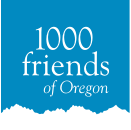At the start of the 2023 legislation, in January, 1000 Friends was following about 150 bills that relate to land use. By February, we brought you an overview of 18 of those bills – the most important ones to watch, relating to housing, natural and working lands, transportation, climate, wildfires, and threats to urban growth boundaries.
Now that we’re midway through the session, we have dozens more to review with you: the originals with their own status updates, plus new bills that we haven’t yet publicly touched on. We also dive into a wider scope of issues, including semiconductor, budget, and rulemaking bills.
The following is a selection of bills we continue to engage with this session, divided into topics.
Subscribe to Our Emails for Regular Updates
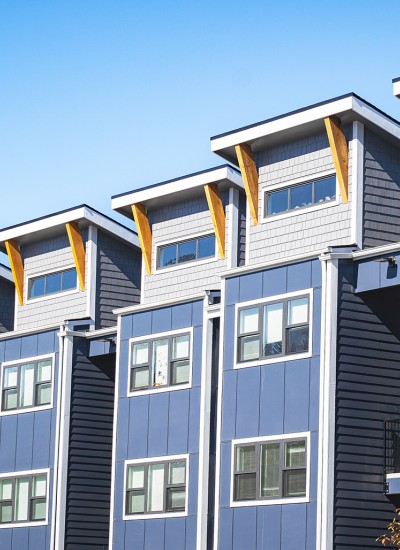
Housing For All
HB 2001Housing for All
SUPPORTED & PASSED
What it does: This bill establishes the Oregon Housing Needs Analysis (OHNA) framework and ensures that Oregon cities and the state enact a full set of land use tools, related investments, and other strategies to support building housing for all, in every neighborhood. (The OHNA was initially outlined under HB 2889, which is now a technical clean-up bill.)
Why it matters: OHNA is a long-overdue update to the way the state and cities plan for, invest in, and ensure housing production, so that every Oregonian has the opportunity for an affordable housing choice in every community, and we live up to land use Goal 10, Housing. It will also take pressure off our lands that produce food and fiber and provide clean air, water, and natural habitat.
Status: Governor Kotek signed HB 2001 into law.
Read our news about the bill's passage
Testimony: Read our February 14 testimony and February 28 testimony.
HB 2983 Manufactured Dwellings and Parks
SUPPORT
What it does: This bill would appropriate $55 million toward the acquisition and rehabilitation of manufactured home parks and the construction of new ones, by nonprofit organizations, co-ops, and housing authorities. It also funds the Oregon Department of Land Conservation and Development (DLCD) to develop model codes for the development of manufactured dwelling parks, and efficiency measures to ensure that cottage clusters (provided for under 2019’s middle housing bill, HB 2001) may include manufactured dwellings.
Why it matters: This would expand Oregon’s commitment to one of the most affordable, quick-to-build home ownership opportunities for Oregonians: manufactured housing parks that are owned by the residents, a nonprofit organization, a co-op, or other similar, stable ownership. And, it provides for manufactured dwellings to be used in cottage cluster housing.
Status: Passed House Committee on Housing; now in Joint Ways & Means Committee.
Testimony: Read our February 2 testimony.
HB 2984 A Reuse Commercial Buildings for Workforce Housing
SUPPORT
What it does: This bill would allow, within UGBs, the conversion of buildings from commercial use to housing without a zone change or conditional-use permit. It prohibits local governments from requiring more parking and limits collection of system development charges.
Why it matters: It would open possibilities for reusing buildings that are well-located and soundly built, but for which there may no longer be viable commercial use, especially after pandemic-related changes to how and where we shop and work. These structures can still provide much-needed housing in our existing communities while preserving existing buildings.
Status: Passed House; now in Senate Housing Committee.
Testimony: Read our February 28 testimony and April 12 testimony, plus follow-up.
HB 3151 Manufactured Dwellings and Parks
SUPPORT
What it does: This bill would offer financial protections and incentives to tenants in manufactured home parks, expand the definition of affordable housing to include manufactured home parks, and expand the state’s loan authority to include constructing new parks (not just acquisition of existing parks).
Why it matters: This bill would continue and expand Oregon’s commitment to one of the most affordable home ownership opportunities for Oregonians, and that can be developed fairly quickly: manufactured housing parks.
Status: Passed House; now in Senate Housing Committee.
Testimony: Read our March 2 testimony and April 12 testimony.
HB 3197 Clear and Objective Residential Development
SUPPORT
What it does: HB 3197 would clarify that clear and objective standards for residential development apply only inside urban growth boundaries (UGBs).
Why it matters: Residential development makes sense within our UGBs; it does not make sense outside UGBs, where the land is zoned mostly for farming, forestry, and natural resources. These areas are not residential zones. Instead, this is where housing is minimized, so as to support, and not conflict with, farming and forestry and not interfere with streams, habitat, wetlands, and other natural areas. In these areas, statutes and rules have properly given local governments discretion to weigh factors and consider conditions in deciding whether a residential use will adversely interfere with these resource uses.
Status: In House Committee on Rules.
Testimony: Read our March 28 testimony and April 27 testimony.
HB 3309 Housing Accessibility
SUPPORT
What it does: This bill would require the Housing and Community Services Department to assess the amount of housing it funds that includes accessibility features, estimate the amount of unmet accessible units in the state, review rules and building code standards that are applicable to accessible units, and file a report with the legislature in September 2024 with its findings and any recommendations.
Why it matters: This bill aims to increase our overall supply of accessible housing in Oregon.
Status: In Senate Housing & Development Committee.
Testimony: Read our March 23 testimony.
HB 3414 Housing Production Accountability Office
SUPPORT
What it does: HB 3414 would establish a Housing Production & Accountability Office in the Department of Land Conservation and Development (DLCD).
Why it matters: This bill is aimed at cutting through unnecessary procedural and other obstacles at the local level, to make it easier to build housing on lands zoned for residential development.
Status: Passed House Committee on Housing & Homelessness, now in House Rules Committee.
SB 406 Housing for All
SUPPORT
What it does: SB 406 adds the cities and certain unincorporated communities in Tillamook County to the list of cities around the state that must comply with the middle housing provisions of 2019’s HB 2001 (not to be confused with this year’s housing bill with the same number). That previous legislation was directed at cities with more than 10,000 people, of which there are none in Tillamook County.
Why it matters: With this bill, the seven incorporated cities and the named unincorporated communities in Tillamook County would have to allow middle housing in all their residential zones, and would also be potentially eligible for funding and planning assistance from DLCD. We applaud the county and its cities for voluntarily choosing to participate in this program, to provide more diverse and affordable housing options for its residents and workers.
Status: Passed Senate; now in House Committee on Housing & Homelessness.
SB 847 Diverse & Affordable Housing Inside UGBs
SUPPORT
What it does: This is a package of various tools to make it easier to build more diverse and affordable housing inside UGBs.
Why it matters: The bill increases opportunities for all Oregonians of every income level to live in all neighborhoods.
Status: Passed House Committee on Housing & Homelessness, now in Joint Ways & Means Committee.
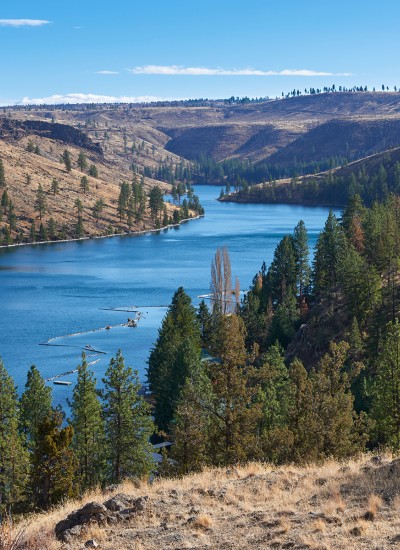
Natural & Working Lands and Food Systems
HB 2192 More Houses in Forest Lands
WATCH
What it does: This bill would modify provisions for the alteration, restoration, or replacement of a dwelling on lands zoned for forest use.
Why it matters: We opposed this bill as it was originally written (along with the identical SB 439, which never made it out of committee) because the proliferation of housing in Oregon’s forests can harm forest health, compromise their carbon-sequestration capacity, and in some places increase wildfire risk. However, the bill has been revised to focus on clarifying the law regarding replacement or restoration of dwellings on forest lands.
Status: In Senate Committee on Natural Resources.
Testimony: Read our February 21 testimony.
HB 2203 RVs on Exclusive Farm Use Land
OPPOSED & BILL STALLED
What it does: This bill would have temporarily allowed a recreational vehicle to be placed on Exclusive Farm Use (EFU) land, under the guise of providing security.
Why it matters: This bill had no real safeguards to assure its temporary nature, and therefore could have become just another dwelling on farmland that is not needed, yet increases conflicts with farming.
Status: This bill had hearing but did not progress out of committee.
HB 2210 Splitting Farmland & Forest Lands into Small Parcels
OPPOSED & BILL STALLED
What it does: This bill would have allowed farmland and forest lands to be split into smaller parcels.
Why it matters: Smaller parcels make it more challenging and expensive to engage in agriculture or forestry, including by making it very difficult to piece together enough land for a viable operation.
Status: This bill stalled out early in the session and never made it out of committee.
HB 2487 More Weddings & Events on Farm Land
OPPOSED & BILL STALLED
What it does: This bill would have allowed lands zoned for exclusive farm use east of the summit of the Cascade range to be used for weddings or events, inflicting yet another “cut” into the integrity of the fabric of Oregon’s farm and ranch lands. It would have added weddings and events to the already too-long list of nonfarm activities that are allowed on EFU land.
Why it matters: Farmers often complain of being asked to cease farming for a wedding event or change their operations, so that noise, dust, and other common farming activities do not interfere with the wedding or other event. These costs add up, and conditions on the events that should reduce the conflicts are often impossible to enforce. HB 2487 would have made this worse by allowing wedding and other event venues on farmland without any limits on the size of the buildings, number of guests, or frequency of events.
Status: This bill had a hearing but did not progress. 1000 Friends is also advocating for an overall revision of the statute that allows so-called home occupations on farmlands, since it has been stretched beyond its original meaning to allow all sorts of events and overnight accommodations. These all need a comprehensive, thoughtful approach, not continued one-offs in each legislative session.
Testimony: Read our January 24 testimony.
HB 2728 Support Oregon Farmers and Help Feed Oregonians
SUPPORT
What it does: This bill would expand Double Up Food Bucks Oregon, a matching program for recipients of supplemental nutrition assistance. For every dollar spent on SNAP-eligible foods at participating farmers markets, farm stands, CSA programs, and grocery stores, shoppers will receive an additional dollar to spend on Oregon-grown fruits and vegetables.
Why it matters: This is a win-win program for Oregon families and farmers.
Status: Passed House Early Childhood Committee; now in Joint Ways & Means Committee.
Testimony: Read our February 6 testimony.
HB 2781 Salem-Area Bridge District
OPPOSED & BILL STALLED
What it does: HB 2781 would have authorized the creation of a redundant bridge district in the Salem area as a first step toward building another bridge across the Willamette River in Salem.
Why it matters: This would have authorized the creation of an unnecessary, additional layer of transportation government. It also would have focused on building additional bridges and roads at a time when Oregon should be focused on repairing existing infrastructure and investing in climate-friendly transportation options.
Status: The bill had hearing but did not progress.
Testimony: Read our February 2 testimony.
HB 2998 A Soils Health
SUPPORT
What it does: This bill would expand and leverage existing programs to provide voluntary, incentive-based support for Oregon farmers to increase soil health through financial incentives, technical assistance, outreach and education, research, and other resources.
Why it matters: The soil health program created would also coordinate and streamline the efforts of multiple entities and agencies that already provide some of these services, and this coordination can only make these efforts more efficient. It is telling that so many Soil and Water Conservation Districts have submitted testimony in favor of this bill.
Status: Passed House Agriculture Committee; now in Joint Ways & Means Committee.
Testimony: Read our February 16 testimony.
HB 3124 BiDRAWS Resilience Package
SUPPORT
What it does: HB 3124 would implement the Bipartisan Drought Relief and Water Security program.
Why it matters: Building and strengthening robust and healthy food systems across Oregon is heavily dependent on retaining the productive capacity of the right amount and right types of farmland, in the right places. Water is a critical element in maintaining that productive capacity.
Status: This bill passed House Committee on Agriculture Land Use, Natural Resources, Water without recommendation; now in House Rules Committee.
Testimony: Read our March 29 testimony
HB 3244 Agriculture Competitiveness Study
SUPPORT
What it does: This bill would require a comprehensive study of competitiveness of Oregon agriculture within the US domestic market.
Why it matters: Agriculture is a backbone of the state’s overall economy. Yet we see regular threats to the foundations of agriculture – including land. We believe HB 3244 will help provide the information needed to support the continued health of Oregon agriculture.
Status: Passed House Agriculture Committee, now in Joint Ways & Means Joint Committee.
Testimony: Read our March 14 testimony.
HB 3366 Oregon Agricultural Heritage Program Funding
SUPPORT
What it does: HB 3366 would continue and expand funding for Oregon Agricultural Heritage Program (OAHP) through Oregon Watershed Enhancement Board. Once fully implemented, OAHP will provide transition planning services for farmers and ranchers and leverage large amounts of federal funding to help willing families invest in permanent or long-term protection of their farms and ranches.
Why it matters: The funding provided under HB 3366 would, for the first time since the program was created, allow for fully staffing the program. It would also provide funding to operate the program which, importantly, can be used to leverage matching federal funding to increase the program’s reach and impact.
We are part of a coalition requesting two additions to the Oregon Watershed Enhancement Board agency budget for the OAHP.
Status: Passed House Ag Committee; now in Joint Ways & Means Committee.
Testimony: Read our March 14 testimony.
HB 3382 Deep Draft Navigation Channels without Land Use Compliance
OPPOSE
What it does: This bill would allow, notwithstanding land use laws, five Oregon ports to construct, maintain, and improve deep draft navigation channel improvements, including docks and similar berthing facilities, that are located within or adjacent to a federal navigation channel or on land.
Why it matters: This bill would override land use laws protecting Oregon’s major estuaries, going around environmental laws that protect estuarine habitats, species, and resources. It would also threaten Oregon’s ability to require “federal consistency” with state laws that are part of a recognized coastal management program, through the federal Coastal Zone Management Act. Oregon could lose its certification from NOAA.
Status: In Joint Transportation Committee.
SB 70 More Houses on Eastern Oregon Farmland
OPPOSE
What it does: Both the SB 70 base bill and the amendment would expand the farmland available to be rezoned to residential use for the 100 homes allowed under 2021’s SB 16. Those homes could be clustered or individually sited throughout the Eastern Oregon Border Region. The Dash-1 amendment is not a significant change from the impact of the base bill.
Why it matters: While it leaves intact SB 16’s broader definition of “high value,” this bill carves out a significant portion of the land in that definition, thereby making those lands available for the SB 16 housing. The amendment would carve out of ORS 195.300 two significant parts: land in irrigation districts and land in the Snake River Valley viticulture area (AVA) - meaning the housing could go on these lands.
Status: Passed Senate Natural Resources Committee without recommendation; referred to Senate Rules Committee.
Testimony: Read our February 8 testimony.
SB 437 A Food Production in Planned Communities
SUPPORT
What it does: This bill would allow residents of planned communities to grow food, despite any covenants or homeowners association requirements to the contrary.
Why it matters: This is a common-sense statute. Raising vegetables, growing fruit trees, raising chickens and honeybees, and other similar activities on one’s residential lot should be encouraged, not prohibited.
Status: Passed House; in Senate Housing Committee.
Testimony: Read our February 15 testimony.
SB 507 A Updating the Farm Direct Marketing Law
SUPPORT
What it does: This bill would update Oregon’s Farm Direct Marketing law, which allows farmers to bring certain low-risk, value-added products to farmers markets and their farm stands. This has strengthened local and regional food systems, as countless farmers and communities, particularly in rural Oregon, have benefited from the increased economic capital generated by farm-to-consumer sales.
Why it matters: SB 507 A offers enhancements that will expand opportunities and benefits that this program brings.
Status: Passed Senate; in House Agriculture Committee.
Testimony: Read our January 25 testimony and April 20 testimony.
SB 648 Vacation Rentals on Working Lands
OPPOSED & BILL STALLED
What it does: This bill would have allowed vacation rentals in any residence on farm, forest, and farm/forest lands.
Why it matters: Although it would have prohibited the use of some dwellings constructed after January 1, 2024, as vacation rentals, SB 648 implicitly condoned the transformation of other farm and forest dwellings into vacation rentals. This also indicates a need to address the impact of vacation rentals on workforce housing.
Status: Bill had a hearing but did not progress.
Testimony: Read our March 6 testimony plus follow-up.
SB 1087 Restaurants on Lane County Farm Land
OPPOSE
What it does: SB 1087 would allow very large “farm cafes” on farmland in Lane County, bypassing existing limitations on food sales on farmland, adding to the already too-long list of what non-farm activities are allowable on exclusive farm use (EFU) land, and increasing non-farm traffic through active farmland.
Why it matters: This bill would allow restaurants, 25-car parking lots, and 5,000-square-foot seating areas on EFU land, essentially allowing restaurants on farmland without the protections that the Land Conservation and Development Commission (LCDC) has already determined are necessary for food sales on farmland. If passed, this bill could open the door for adoption of similar measures across Oregon.
Status: In the Senate Committee on Rules.
Testimony: Read our April 6 testimony, plus follow-up.
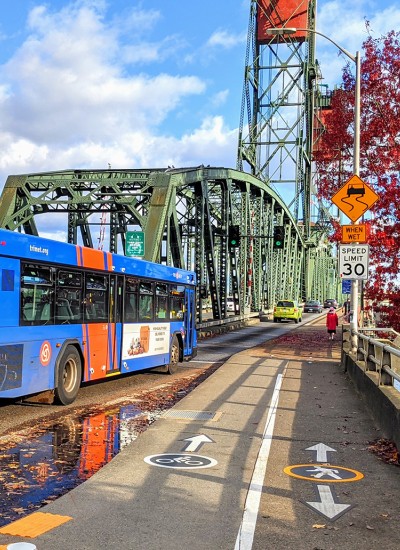
Transportation
HB 2619 Oregon Transportation Commission Expansion
SUPPORT
What it does: This bill would revise and expand the Oregon Transportation Commission (OTC) to ensure regional balance and equity. It would change OTC membership to be based on congressional districts, expand the number of seats from five to nine, and require representation for youth, tribal, disability, and transit dependent identifying individuals. The OTC impacts high-level policy and investments in transportation.
Why it matters: The OTC establishes the policies for the Department of Transportation and oversees the way it collects and spends more than $5 billion every year. The five members of the OTC are appointed by the governor and confirmed by the Senate. However, there is little statutory guidance on membership, and over the years, the OTC membership has not reflected a diversity of transportation experiences. This is a critically important decision-making body, and it should include more perspectives.
Status: In Joint Committee on Transportation.
HB 2677 Fix It First
SUPPORT
What it does: HB 2677 would turn ODOT’s “Fix it First” highway system approach into reality. It would require ODOT to prove that any expansion in lane miles won't harm ODOT’s ability to maintain the entire highway system.
Why it matters: Transportation makes up 40 percent of Oregon's greenhouse gas emissions, and it is growing. Highways play a major role in this, yet despite having persistent repair backlogs, ODOT continues to prioritize expanding highways over maintaining our current system and providing sustainable alternatives.
Status: In Joint Committee on Transportation.
HB 3014 A Alternative Transportation Options for Schools
SUPPORT
What it does: This bill would give greater flexibility to school districts in funding multi-modal, active transportation options for kids to get to school.
Why it matters: Providing safe ways for kids to get to school on foot, bike, and bus means healthier kids and fewer cars on the road.
Status: Passed House Committee on Education; now in Revenue Committee with referral to Joint Ways & Means Committee.

Climate
HB 2534 A State Energy Policy
SUPPORT
What it does: This bill would require the State Department of Energy to develop a comprehensive state energy strategy that identifies optimized pathways to achieving the state's energy policy objectives, including renewable energy.
Why it matters: The current lack of a state-level energy plan is a significant hindrance to the integration of renewable energy needs with those of agriculture, natural resources, ranching, forestry, coastal resources, and communities. This comprehensive state energy assessment and strategy should set the stage for a more coordinated, public-oriented system of generation and transmission.
Status: Passed House Climate Committee; now in Joint Ways & Means Committee.
Testimony: Read our February 13 testimony.
HB 2659 Throws out Climate Friendly & Equitable Communities Program
OPPOSE
What it does: This bill repeals climate rules adopted by the Land Conservation and Development Commission (LCDC) that are applicable to Oregon’s eight major urban areas. The Climate Friendly & Equitable Communities program would – unless repealed by this bill – reduce climate-damaging emissions by integrating land use and transportation planning to reduce the need to drive and increase safe, accessible walking, biking, and transit.
Why it matters: The rules were adopted after extensive public engagement, and are designed to integrate land use and transportation planning to reduce greenhouse gas emissions from the state's number-one source – transportation – while ensuring that the benefits of mixed-use, walkable, transit-served neighborhoods are accessible to all by providing for diverse housing options. This bill substitutes a process that will take until at least 2028 and has weak standards.
Status: Passed House Committee on Agriculture without recommendation and referred to House Rules Committee.
Read our fuller report on this bill.
Testimony: Read our April 4 testimony.
HB 2990 Support for Community Resilience Hubs
SUPPORT
What it does: This bill will create a grant program for communities to build and implement Community Resilience Hubs and networks.
Why it matters: Oregonians need additional, community-scale support preparing for, responding to, and recovering from climate change and other crisis events, such as wildfires. The bill would create community-designed and operated centers that will help neighbors find the safety and services they need before, during, and after a wildfire, heat wave, or climate disaster strikes.
Status: Passed House Committee on Climate; now in Joint Ways & Means Committee.
HB 3016 A Community Green Infrastructure Grant Program
SUPPORT
What it does: This bill would establish the Community Green Infrastructure Fund and Grant Program. The funding will be focused on community programs that provide direct social, environmental, and economic benefits to communities through green infrastructure in the form of climate adaptation, mitigation and resilience, local jobs, public or community health benefits, and local food sovereignty. The bill also directs the State Forestry Department to establish a statewide urban tree canopy assessment tool.
Why it matters: This will provide critical information for many programs, including land use planning, heat-island mitigation, carbon-sequestration assessment, and more.
Status: Passed the House Climate Committee, and now in the Joint Ways & Means Committee.
Testimony: Read our March 1 testimony.
SB 522 Modernizing the Oregon Global Warming Commission
SUPPORT
What it does: This bill would change the name of the Oregon Global Warming Commission to the Oregon Climate Action Commission, modify the commission’s membership and duties of commission, and update state’s greenhouse-gas-reduction targets.
Why it matters: Changing the name to the Oregon Climate Action Commission will better reflect the breadth of the commission’s responsibilities. Tying those responsibilities and the recommendations that come out of their work to the best available science will ensure best possible outcomes. And broadening the number of voting members, ex-officio members of the Commission, and state agencies that coordinate their work with the commission will only help make Oregon’s climate response work more efficient and effective.
Status: Passed Senate Committee on Energy & Environment; now in Joint Ways & Means Committee
Testimony: Read our February 21 testimony.
SB 530 Supporting Working Lands and Natural areas by Investing in Voluntary Climate Sequestration
SUPPORT
What it does: This bill will establish the state's natural climate solutions policy. It would position the state to leverage federal funding and private investments in natural climate solutions on natural and working lands. It would create a source of state funding for voluntary actions to remove climate pollution from the atmosphere and store it in natural and working lands. And it would fund state agencies to provide incentives and technical support to forest owners, farmers, and ranchers to implement natural climate solutions on natural and working lands.
Why it matters: SB 530 is voluntary and incentive-based; it creates a win-win for the farmers who participate and for the climate.
Status: Passed Senate Committee on Natural Resources; now in Joint Ways & Means Committee.
Testimony: Read our February 15 testimony.
SB 3181 Solar Facility Siting
SUPPORT
What it does: SB 3181 would establish an agency-lead process to develop rules and other recommendations for siting large-scale solar facilities.
Why it matters: This establishes a long-needed process, taking into account all needs – farming, ranching, cultural, wildfire, water, solar industry, and local communities.
Status: In the Joint Committee on Ways and Means.
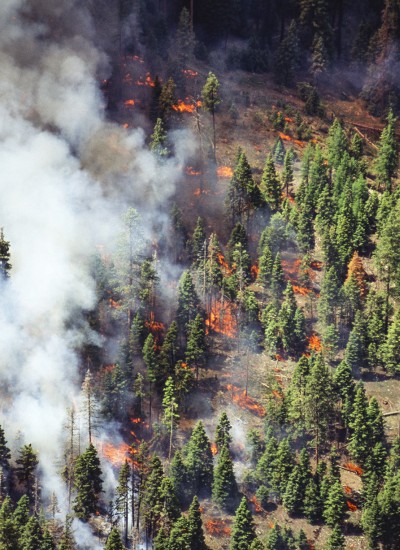
Wildfire Resiliency & Preparedness
SB 80 State Hazard Mapping
SUPPORT
What it does: This bill reclassifies the state wildfire map as a hazard map (not risk) with four hazard levels and adds an “unclassified” category. It also centers community outreach and education on the use of this map to focus preparedness and resiliency investments, assistance, and standards in high-hazard areas and areas with vulnerable populations.
SB 80 also establishes several funds and programs: the Landscape Resiliency Fund, Community Risk Reduction Fund, and Wildfire Home Preparedness Program for these purposes. The home-preparedness program would aid in the retrofitting and building of dwellings to be resistant and resilient to wildfire, focusing on economically and socially vulnerable communities. The budget request is $10 million.
Why it matters: Senate Bill 80 maintains the map’s scientific integrity of indicating the exposure to wildfire hazard that exists based on landscape-scale climate, weather, topography, and vegetation. This will enable the map to be more effectively used as originally intended: as a guide for where to focus investments, technical assistance, on-the-ground crews, infrastructure protection, evacuation planning, and appropriate regulations to make Oregon families and their communities more wildfire prepared and resilient.
Status: Passed out of the Senate Natural Resources Committee; now in Joint Ways & Means Committee.
Testimony: Read our March 27 testimony.
SB 509 Make Oregon Communities More Wildfire Prepared and Resilient
SUPPORT
What it does: This bill would continue and expand next steps in a wildfire-resilient Oregon: It would establish neighborhood risk-reduction programs to provide training, grants, and investments in community defensible space and home hardening, and better coordinate and align state agencies and other entities to support wildfire-risk reduction. It also establishes the Home Hardening Assistance Fund, focusing those investments on people with higher vulnerabilities and lower incomes in high-risk areas.
SB 80 also would provide direction and programs for the Oregon State Fire Marshal to support community fire-safety efforts, including supporting local governments with fire-safety grants and creating a user-friendly online fire dashboard. The budget request is $10 million for the Community Risk Reduction Fund created in SB 762.
Why it matters: A wildfire-prepared and resilient Oregon requires all Oregonians to feel informed, empowered, and supported in their own community to take appropriate preparedness actions.
Status: Passed Senate Natural Resources Committee; now in Joint Ways & Means Committee.
Testimony: Read our February 6 testimony.
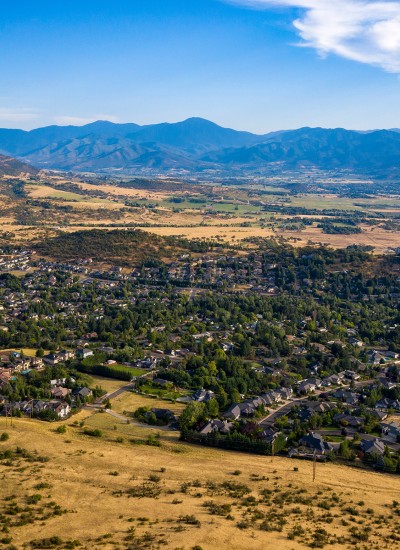
Threats to UGBs
HB 2795 Prohibiting Golf Courses from Designation as Buildable Land
OPPOSED & BILL STALLED
What it does: This bill would prohibit including any golf courses inside urban growth boundaries (UGBs) from being considered as “buildable” lands in a city’s buildable-lands inventory that determines where housing can be built, even though golf courses have often been developed when the golf use no longer makes sense.
Why it matters: This bill would mean omitting potentially buildable lands for housing, and adding pressure to expand UGBs, including onto productive farmland.
Status: Bill did not progress out of committee.
HB 3191 Premature Expansion of UGBs into Urban Reserves
OPPOSED & BILL STALLED
What it does: HB 3191 would allow expansion of urban growth boundaries (UGBs) into urban reserves without application of the land use goals.
Why it matters: The bill would undermine the purpose of urban reserves, allowing premature UGB expansions into reserves under conditions that could be challenging to enforce and that risk deflecting city planning and investments away from lands already inside the UGB.
Status: Bill did not progress out of committee.
SB 1051-2 Undermines UGBs and Urban Reserves
OPPOSED & BILL STALLED
What it does: This is another bill that would have allowed urban growth boundary expansions into urban reserves without application of land use laws.
Why it matters: SB 1051 would have undermined a very effective urban-planning tool and is contrary to commitments we just made in the Oregon Housing Needs Analysis (OHNA) bill, now part of HB 2001.
Status: Bill had hearing but did not progress. However, this concept might yet be pushed in a later bill this session, and if it does, we will let you know.
Testimony: Read our March 20 testimony.
SB 656 UGB Expansion without Land Use Laws
OPPOSED & BILL STALLED
What it does: SB 656 would have allowed expansion of urban growth boundaries (UGBs) without application of statewide planning goals.
Why it matters: It would have diverted public investments away from lands inside UGBs, where they should be focused to make existing urban land development-ready.
Status: Bill did not progress out of committee.

Semiconductors
SB 4 Semiconductor CHIPS Act Bill
NEUTRAL & PASSED
What it does: SB 4 makes $210 million of state money available to assist Oregon’s semiconductor industry. It helps semiconductor companies compete for federal funding made available by the CHIPS and Science Act, and it supports higher education institutions, workforce development, and site readiness for semiconductor expansions. The bill gives unprecedented authority to the governor to bring a certain number of sites, of specific sizes, into an urban growth boundary (UGB) by executive authority – only if there is no other available land for possible semiconductor expansion.
Why it matters: Semiconductors are one of Oregon’s major industries, and the bill’s financial and educational incentives will help grow our high-tech workforce for the future and bring existing industrial lands to full readiness. As Oregon assists this industry, we must also protect our other economic pillars, like agriculture, forestry, and tourism. The governor’s special executive authority expires at the end of 2024, and land brought inside a UGB under this law would be removed from the UGB if federal funding is not awarded for the project at hand. As a result of this SB 4 process, cities across the state have put forward industrial sites within their UGBs that are large and well-suited to high-tech development; we believe that the governor's executive authority will not be needed.
Status: Governor Kotek signed SB 4 into law.
Testimony: Read our March 13 testimony.

Budget Bills
HB 2907 Meat Processing
SUPPORT
What it does: This bill would include funding to expand the state meat processing grant fund.
Why it matters: The first round of funding showed far more demand than there was funding to support.
Status: Now in Joint Committee on Ways & Means.
HB 2098 Interstate Bridge Replacement Funding
WATCH
What it does: This bill allocates Oregon state's portion of funding to replace the Interstate Bridge that spans the Columbia River and connects Oregon and Washington. Funding specifications and bridge design are intrinsically linked. This bill is a placeholder, and an amendment, the -2, is the currently proposed funding scheme for Oregon’s $1 billion contribution toward the project, which has a total cost estimate as high as $7.5 billion.
Why it matters: 1000 Friends of Oregon supports replacing the I-5 bridge with a seismically safe bridge that expands transportation options, including transit and active transportation, across this corridor. However, we do not support certain elements in the -2 amendment to HB 2098.
Specifically, we do not support bundling together a bridge replacement with a freeway expansion, which is how the project is currently proposed. This greatly increases the overall project cost and will induce more driving in the long run. In line with this, we are concerned that the proposal lacks critical financial safeguards. We’ve recommended several changes to achieve a "right sized" bridge. We are asking the legislature to:
- Phase project funding like Washington state has done, which is also contributing to the cost. This enables the legislature to monitor implementation and make changes, if necessary, including as it faces inevitable cost overruns.
- Require one cost-effective option that still expands transit and active transportation options to be developed and considered. This leaves legislators the opportunity to be smart investors with their limited resources instead of only have one option
- Limit general fund expenditures to only what you need for federal transit grants (about $250M-$275M), and utilize Highway User Tax Revenue Bonds to pay for the rest. This is in alignment with the user pays model we have developed for Oregon’s highways.
- Incorporate financial safeguards currently in law, and expand them to ensure this project stays on budget.
Status: In the Joint Committee on Transportation.
Testimony: Read our April 27 testimony.
HB 5014 Farm to Schools Program
SUPPORT
What it does: This bill would Include funding for the Farm to Schools Program.
Why it matters: The main thrust of this program is to provide healthy and nutritious food to Oregon’s school children, including early childcare and education and summer lunch. The Farm to School Program is one of those rare opportunities to get multiple wins with one move: It not only supports Oregon’s children, but also our farmers and our communities.
Status: Now in Joint Ways & Means Subcommittee on Education.
Testimony: Read our March 23 testimony.
HB 5025 Higher Education Budget Budget
SUPPORT
What it does: This bill would appropriate money from the General Fund to the Higher Education Coordinating Commission (HECC) for certain biennial expenses.
Why it matters: The Oregon Conservation Corps, component of 2021’s SB 762, was funded under the HECC. This program leverages youth corps job training programs to increase community-preparedness work in and around communities.
Status: In Joint Committee On Ways and Means.
HB 5027 Department of Land Conservation and Development Funding Bill
SUPPORT
What it does: This is the Department of Land Conservation and Development (DLCD) budget bill, which would appropriate money from the General Fund for certain biennial expenses.
Why it matters: We are supporting four budget additions (Policy Option Packages) to the agency’s budget bill.
- POP 91: Housing Needs Analysis / Housing Production & Accountability Office
- POP 201: Equitable Community Engagement
- POP 202: Wildfire Adapted Communities
- POP 203: Climate Friendly & Equitable Communities Program
- POP 209: This is a small request for a position that will be mostly paid for by federal funds, focused on helping local governments with floodplain and flood planning.
- POP 210: Chief Information Officer
- POP 212: Continues funding for climate adaptation position that coordinates implementation by 25 state agencies to assist local governments with climate change.
Status: It is in the Joint Ways & Means Committee.
Testimony: Read our February 14 testimony.
SB 458 Oregon State University Ag Program Funding
SUPPORT
What it does: This bill would support Oregon State University’sStatewide Public Service Programs – the Agricultural Experiment Station, Extension Service, and Forest Research Laboratory; known collectively as “The OSU Statewides.”
Why it matters: The funding request includes strategic investments to support sustainable food production, accelerate approaches to sustainable forestry, and increase efficiency in agriculture production, among other things.
Status: Passed Senate Education Committee; now in Joint Ways & Means Committee.

Rulemaking
SB 42 Agency Rulemaking
OPPOSED & BILL STALLED
What it does: SB 42 would have modified provisions relating to fiscal impact statements for administrative rules.
Why it matters:This bill would have thrown obstacles into normal agency rulemaking.It would have required additional considerations that are not balanced and overlooked the broad interests that are already included in the process and analysis made in adopting rules. And the bill would have allowed a small number of people outside of the legislative and rulemaking processes to effectively delay and possibly prevent the adoption of rules that have been directed by the legislature and have gone through extensive public process
Status: Bill had hearing but did not progress.
Testimony: Read our February 14 testimony.
